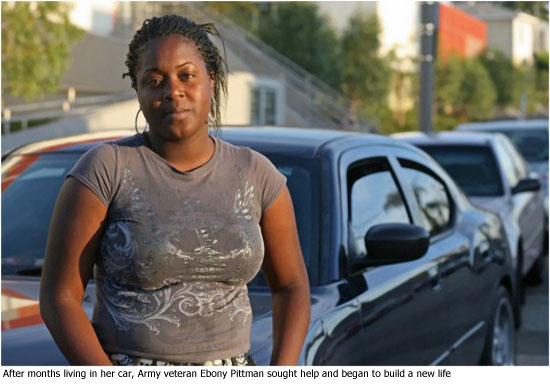A veteran’s plight—and a plan to help
February 17, 2010
Army supply clerk Ebony Pittman returned from Iraq last February after a 10-month tour of duty at a Special Forces base in Balad.
By September, she was sleeping in her car on the streets of L.A.
Pittman was 23. She’d served her country honorably for more than three years. She had a high-school diploma. But she found that re-entry into civilian life in Los Angeles was nearly as full of pitfalls as her tour of Iraq.
“I thought, ‘I’m ‘Army strong.’ I don’t need anybody’s help,” Pittman recalls. “I was just really frustrated, and I didn’t know what to do.”
To help returning veterans like Ebony Pittman, the Board of Supervisors approved a proposal at its meeting Tuesday to create four new positions to advise veterans on matters of mental health, substance abuse, homelessness and legal and family issues. The aim is to use the advisors to assist returning veterans with the sometimes tumultuous transition to civilian life.
The advisors will join a new Veteran Systems Navigator program, designed to assist those returning from “combat to community,” including vets straining to reintegrate. The new program aims to help about 3,000 returning veterans–some as young as Pittman, others in their 30s and 40s—as they get back to civilian life.
With the influx of veterans from Iraq and Afghanistan, there is an increasing need for counseling and other mental health care, according to county officials. The caseload at the county’s Department of Military and Veterans Affairs has risen 39 percent since last year, “and current staff cannot handle this mental health issue,” DMVA director Joseph N. Smith wrote Supervisors in a letter supporting the expansion of the navigator program.
The new advisors, whose positions will be funded by California Proposition 63 (Mental Health Services Act of 2004), will help vets navigate the federal Department of Veterans Affairs as well as services offered by the county and state, Smith says. Smith, a retired Marine colonel, says “there are more needs than the VA can handle.”
Together with an existing staffer, the hires would allow the department to spread the system navigators throughout the county. Funding for the four positions will be transferred from the county’s Department of Mental Health.
The difficulties of re-entry for today’s service men and women will be the subject of a March 1 conference for providers and policy-makers co-hosted by the County Department of Mental Health, the Veterans Affairs Greater Los Angeles Healthcare System and the VA Desert Pacific Mental Illness Research, Education and Clinical Center at the Brentwood Theater on the VA campus in West L.A.
Pittman’s problems began soon after she mustered out of the Army in May and returned to L.A. from the army base in Colorado where her unit was stationed. She struggled with depression, exacerbated, she thinks, by memories of an Army friend who’d killed himself in Iraq. She hasn’t slept more than a few hours a night since her return.
She also is haunted by the faces of Iraqi victims of a suicide bomber she saw at the base morgue. “I still see them every day,” she says.
Pittman grew up as a foster child in Los Angeles and has few family resources to fall back on.
For a few months, Pittman had a place of her own, but she couldn’t find steady work and lost her apartment after her slim savings ran out. She began crashing with friends and relatives, but nothing worked out well.
“I didn’t like feeling like a burden to anybody,” she says.
And most of her personal belongings were stolen in a pair of burglaries, including a television, her service body armor, jewelry, clothing, shoes and a laptop computer.
By fall, she had crammed her remaining possessions into her Dodge Charger and began sleeping nights in the front seat.
Pittman began to turn herself around while still on the street. She started last fall by getting psychological counseling at the VA hospital in West Los Angeles.
Pittman also signed up for a housing voucher from the federal Department of Housing and Urban Development’s subsidized housing program for veterans that she learned about from a friend. She’s now apartment hunting, getting referrals from the Venice-based St. Joseph Center, a social services provider that may also help her with a deposit.
Since Thanksgiving, Pittman has been living with a relative in Los Angeles, an arrangement that she believes will work well until she secures her own place. And late last year, she found a new job, as a telemarketing sales rep for a satellite television provider. With an income and the prospect of a new place, she’s thinking ahead to starting college under the GI Bill. She wants to study forensic science and perhaps become a police officer.
Providing help to veterans like Pittman should get a little easier thanks to the new county program passed Tuesday. In some cases, the help might be as simple as connecting them with veterans’ education benefits. In other cases, a vet in trouble may need to connect with services ranging from mental health care to unemployment insurance, family counseling or legal assistance.
Overcoming pride and asking for help was a crucial first step, Pittman believes. “You do need help,” she says, “and that’s okay.”
Posted on 2/16/10













 405 bridge work causes a stink
405 bridge work causes a stink
